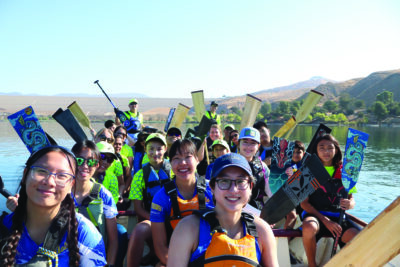April 30th is International Guide Dog Day and local leaders are being recognized for their efforts in helping foster an inclusive community for all.
Among those in the community include Pam English, an area leader for Guide Dogs of America — Tender Loving Canines, who has taken pride in raising 38 puppies throughout her 38 years as a volunteer with the organization.
“My husband and I had a couple of little kids, and we had a little border collie of our own. We learned that there was a guide dog school not too far away… so we contacted the school to see if we could go on a tour,” English said.
“We went to the graduation, and some were [from] Guide Dogs of America…. I had also seen a presentation at the Valencia Library on a children’s read kind of day, and they were putting out a plea for puppy raisers for the same organization. We thought that it might be kind of neat to do that.”
English and her husband, Bob, applied to raise a puppy, and had a home visit from a volunteer in order to move forward with raising their first puppy.
“Our first puppy was Trooper — he was a black labrador. As we met visually impaired graduates and as we became more involved at the school and puppy raising meetings, things blossomed. We loved raising our first puppies. The benefits for the kids was public speaking, because they could talk about something that no one else really knew,” English said.
As the years went on and the family raised multiple puppies, English knew that she not only liked the experience, but that they were “changing someone else’s life.”
“We [did this] to give somebody else the independence and confidence that they deserved to get out into the world, and even though they couldn’t see the world, the dog would provide their eyes,” English said.
“Today we are the area leaders of the Santa Clarita Valley Puppy Rangers…. We have dogs that are still providing guide work for visually impaired people, but also have dogs that will be paired with families that have children with autism.”
In addition, other dogs are trained to help veterans with mobility issues, or PTSD, as well as facility dogs that work with a facility and would have clients benefit from special skills the dogs are trained to use.

English has been an area leader since 2008, and takes on a multitude of tasks to help other puppy raisers in the city feel comfortable.
“The puppies are born and bred at Guide Dogs of America — most service dog schools will breed their own dogs because you’re looking for a particular temperament. When the puppies are eight weeks of age, they go home to their puppy raisers.
“Up until then, they are working with volunteers and staff on campus,” English said. “And they will be with their puppy raisers between 16 to 18 months of age. At that point, they’re going to be leaving their puppy raisers and heading off to college.”
Puppy raisers take the puppies from kindergarten to high school, with monthly outings including “Friday Walks” as a group, before saying their goodbyes once the puppies head off to college. From there, families will hear updates, and even reunite with their dogs who graduated.
Currently, English is raising Hardy, who just turned one, and Nanook, who is five months old.
“I teach puppy kindergarten [which is 8 weeks]… [Bob] and I also host puppy raiser orientations twice a month for anyone considering it. Basically, as an area leader, we’re there to assist them through all that we’re doing ourselves with our puppies,” English said.
“The families typically meet the dogs once the dogs are fully trained. If it’s at a distance, there’s going to be phone calls. The staff works with these dogs, so they know them really well and can get an idea, and they get an idea of which dog’s going to match with them.”
Ideally, the dogs are raised to become service or guide dogs, but even if the dogs don’t end up meeting the standards, they use their developed skillset to assist in loving ways.
“This program is internationally accredited. That means you can have some pretty good dogs, but they don’t quite meet the standards that we’re looking for. We’ve had two that have been certified as therapy dogs. A therapy dog is a pet who is certified of a calm nature, and they’re able to go out,” English said. “[Regardless,] a lot of times, they can be a very happy, wonderful pet.”












